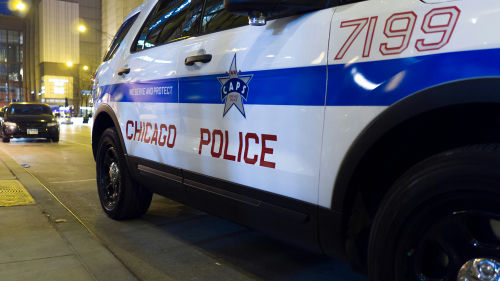President Trump’s warning to Governor Pritzker signals a no-nonsense federal approach to Chicago’s deepening crime and immigration crisis, igniting fierce debate over state sovereignty and public safety.
Trump’s Promise of Swift Federal Action in Chicago
President Trump’s recent statement, promising to give Chicago the “DC treatment” unless Democrat Governor J.B. Pritzker gets control of the city’s ongoing crime and illegal immigration issues, has electrified conversations nationwide. Trump’s approach echoes his administration’s broader crackdowns in previous years, where federal intervention was used to restore order in cities plagued by violence, lawlessness, and what many see as the direct consequences of progressive, lenient policies. Trump’s supporters argue that federal action is needed to protect American citizens when local leaders “refuse to do their jobs,” framing the situation as a fight for law, order, and constitutional integrity.
Governor Pritzker has responded forcefully, decrying Trump’s vow as a threat to state sovereignty and accusing the administration of exploiting Chicago’s challenges for political gain. Pritzker has publicly insisted that federal troops are not welcome in Chicago, claiming that such actions undermine local governance and ignore the root causes of crime, including economic inequality and gun access. Progressive groups have rallied around Pritzker, warning that Trump’s plan would escalate tensions and erode community trust. These accusations have only fueled the determination of many conservatives, who see the state’s resistance as further evidence of failed leadership and misplaced priorities.
Federal Authority Versus State Rights: The Constitutional Clash
The prospect of deploying federal law enforcement or National Guard units to Chicago has reignited constitutional debates about the limits of presidential power and the rights of local governments. Trump’s administration cites the president’s responsibility to protect American citizens from threats to public safety and national security, especially when state and city officials are seen as abdicating those duties. Citing recent executive orders, the administration emphasizes its obligation to enforce immigration laws “against all inadmissible and removable aliens,” particularly in jurisdictions where local cooperation with federal authorities is lacking. Supporters argue this is not just a policy preference but a constitutional mandate, especially when local inaction endangers the broader public.
Critics, however, argue that such moves represent federal overreach and risk undermining the principles of federalism. They warn that using federal forces without state consent could set a dangerous precedent, eroding the autonomy of states to manage their own affairs. This conflict is playing out in real time as Trump’s team prepares contingency plans, including the potential use of military and deputized local police for mass enforcement actions in cities like Chicago. The administration’s allies contend that extraordinary times require extraordinary measures, especially when public safety is on the line.
Underlying Issues: Crime, Immigration, and Progressive Policies
At the heart of the standoff is the stark divide over what is driving Chicago’s turmoil. Conservatives blame years of progressive policies—sanctuary status, lenient prosecution, and restrictions on police—arguing these have enabled criminal activity and illegal immigration to flourish. Trump’s recent policy initiatives include calls for stricter border enforcement, expanded use of E-Verify, and the elimination of programs that, in the administration’s view, incentivize illegal entry and undermine law and order. The White House frames these moves as essential to restoring safety and fiscal sanity after a period of what they call “unprecedented flood” of illegal immigration and rising urban violence.
Progressive voices, in contrast, attribute Chicago’s struggles to systemic inequities, arguing that poverty, lack of opportunity, and insufficient investment in communities—not federal enforcement—are at the root of rising crime. Governor Pritzker and his allies claim that the Trump administration’s agenda does not address these underlying causes, instead pursuing aggressive tactics that risk deepening social divides. This ideological rift has only sharpened as each side claims to defend the true interests of American families, with the Biden-era legacy and Trump’s current policies providing starkly different visions for the country’s future.
What’s Next: A Test for Constitutional Values and Public Safety
As President Trump signals readiness to intervene in Chicago, the nation finds itself at a crossroads between constitutional tradition and the urgent demand for public safety. The administration’s supporters believe that decisive federal action is long overdue in cities where progressive policies have failed, especially on issues of crime and immigration. Critics remain wary of the precedent such intervention sets, fearing an erosion of state rights and escalation of conflict. With both sides entrenched, Chicago now stands as the latest battleground for America’s deepest divisions over security, governance, and the future of constitutional order.
Trump vows to give Chicago the DC treatment unless Democrat Gov. Pritzker gets his act together: ‘We’re coming!’ https://t.co/JyucQdK4On
— frank (@frank5983916963) September 1, 2025
In the coming weeks, all eyes will be on the interplay between the White House and Illinois’ leadership. The outcome will have significant implications—not just for Chicago, but for how America balances federal authority, public safety, and the enduring principles that define the republic.
Sources:
Trump on Immigration | American Civil Liberties Union
Ten Harmful Trump Administration Immigration and Refugee Policies
Protecting The American People Against Invasion – The White House
The Anti-Immigrant Policies in Trump’s Final “Big Beautiful Bill …
Click this link for the original source of this article.
Author: Editorial Team
This content is courtesy of, and owned and copyrighted by, https://www.conservativecardinal.com and its author. This content is made available by use of the public RSS feed offered by the host site and is used for educational purposes only. If you are the author or represent the host site and would like this content removed now and in the future, please contact USSANews.com using the email address in the Contact page found in the website menu.





